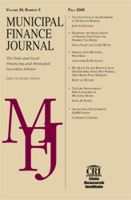Tax-Exempt Financing of Sectarian Institutions Following the Supreme Court’s Decision in Trinity Lutheran Church of Columbia, Inc. v. Comer
Author: Matthias M. Edrich.; Lauren Ferrero.; Ann C. Lebowitz.; John Utley.; Paul Wisor.
Source: Volume 38, Number 04, Winter 2018 , pp.43-70(28)

< previous article |next article > |return to table of contents
Abstract:
A fundamental role of bond counsel in a bond transaction is to provide an unqualified opinion regarding the validity of debt under state and federal law. The determination that debt is valid requires consideration of laws that apply to the particular type of transaction. In transactions benefiting religious organizations, courts have historically interpreted federal and state constitutional provisions that limit government involvement with religion using the tests applied by the United States Supreme Court in Hunt v. McNair. Bond counsel must be versed in these tests to make a meaningful determination regarding the validity of a bond issue involving a sectarian institution. The purpose of this article is to assist bond counsel in making that determination by identifying and examining trends in court opinions dealing with sectarian institutions. The Court’s recent opinion in Trinity Lutheran Church of Columbia v. Comer suggests that jurisprudence in this field is still evolving.Keywords: Tax-exempt financing of sectarian institutions, Internal Revenue Code of 1986, conduit issuer financing, Blaine Amendments, Establishment Clause, Free Exercise Clause, Lemon-Agostini Test, Hunt v. McNair, pervasively sectarian standard
Affiliations:
1: Kutak Rock LLP; 2: Norton Rose Fulbright US LLP; 3: Law Office of Ann C. Lebowitz; 4: Kennedy & Graven, Chartered; 5: Kline Alvarado Veio PC.